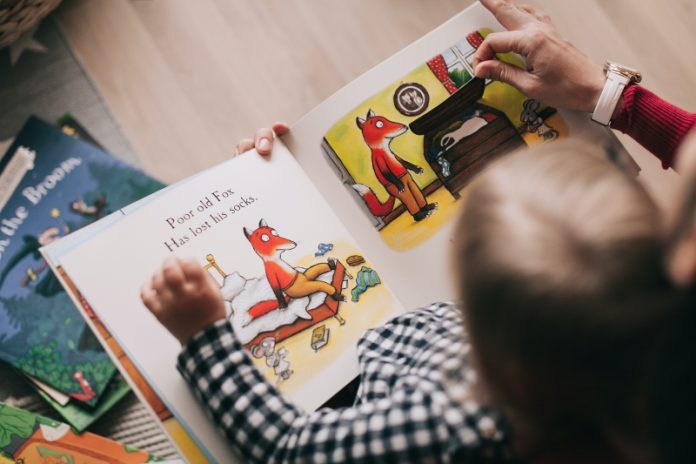
Regular readers of this blog will know that I love to read, and that I read different types of genres. Regular readers of this blog might also be aware from some of my blog posts that I think children reading is extremely important and shouldn’t be left until they start school, a love of reading starts at home long before a child starts attending school. I believe reading is the base for all future education and should be encouraged as early as possible. But getting children to read can be a bit of a challenge, frustrating at times, especially at young ages – I mean, how do you get a toddler to sit still long enough to read a story together?
There is no set formula for teaching your children to read, but there are plenty of things you can do to help encourage them. It is never too early to introduce children to books and reading. Here are some tips to help you and your children on their reading journey.
- Read yourself – Set a good example by letting the kids see you sitting down to read. I grew up in a house of books and watching my mum read, I’m sure that this is what has led to my love of reading. Babies are always learning and take in everything around them, so watching you picking up a book, newspaper or magazine and reading it will just seem a natural thing to do and hopefully it will stick with them, and they follow suit when they can.
- Read bedtime stories to/with them – kids love the sound of a voice telling them a story, so reading them bedtime stories as early as possible will introduce them to the world of storytelling, books and reading. Snuggle up with a book and read together, younger children will love looking at the bright and colourful images while you read the story together, whilst slightly older children will love the quality time together and even reading to YOU. It is also an excellent way to develop language/communication skills.
- Select baby/child-friendly/age-appropriate books and keep them within easy reach of the child – if you put the books out of their reach, they are never going to pick one up and look through it or read it.
- Make reading part of your daily routine with at least 10 minutes per day, bedtime being a good time to do it.
- With toddlers, they WILL get up and move around whilst you are reading with them, but while it might seem that they are not listening and taking it in, they will be – so don’t lose heart and put the book down. Toddlers have a short attention span so don’t read books that are too long for their age. Keep reading with toddlers, short and simple text, and read little bits several times over the course of the day.
- Try to inject fun into the stories, don’t just read in a monotonous voice – use different voices, humour where possible and expressions. Get the kids involved in the story. It will make storytelling and reading lots more fun and the children then will only look at books in a positive light.
- Make sure that any book you choose is engaging and interesting, one that will have points of discussion. Don’t just pick a book that you as an adult will find interesting, pick a book together.
- When able, ask questions about the book to test comprehension and get them talking. Reading really can help with speech, language, understanding, imagination and communication.
- Don’t just limit reading to books and storytime, get them to read snippets from the cereal box at breakfast time for example.
- Re-reading books isn’t a problem and should actually be encouraged. Don’t worry if they want to read certain books over and over again (but when reading a book for themselves do sit with them, listen and pay attention to make sure that they are actually reading and haven’t just memorised the story). Re-reading books is a good way to help with faster reading, accuracy and word recognition.
- Take turns with the reading, each reading a page each. Kids enjoy bedtime stories, the quality time at the end of the day is an excellent bonding experience. Taking turns each with the reading is a big step to them reading on their own whilst enjoying the quality time of being read a bedtime story.
- With older children or reluctant readers, find a book series they enjoy and get them to start reading the next book in the series once finished a book. This will help keep their interest and make them more likely to pick up a book.
- Do try and vary their reading using fiction and non-fiction as well as different authors and genres to vary writing styles and interests.
- With older children, discuss what has happened within the book and what they think might happen further along in the book.
- Be patient. Children will learn to read and different rates. Give them time to try and sound out any unfamiliar words. Help them use phonics if they are at the stage where they have learnt them (I personally found the phonics system brilliant after initially thinking that it wasn’t going to work as that wasn’t the way I was taught at school). Don’t just tell them the unfamiliar word that they might be struggling with and move on, it won’t help them.
- In the UK we have the use of free libraries. Make use of them or they will disappear. Go to the library together and select a few books to read. It is always fun to choose new books. Libraries also offer a lot more than book borrowing with Lego clubs, special events, author talks and even arts & crafts sessions. I volunteer in a small local library and seeing the faces of small children on their very first visit is priceless, and seeing them come back regularly shows how important a library is.
- Have a family bookshelf at home if you have the space. If you can, have a bookcase or bookshelf in the children’s bedrooms filled with their favourite books. With easily accessible books they are more likely to pick one up.
- Give books as presents. This can be a much better gift, especially as you have to put some thought into the book to suit their reading tastes.
- Encourage them to swap or borrow books with their friends – this will not only increase their access to a variety of books but could also widen their reading material, especially with book recommendations from their peers that might be different from their usual reading habits.
- Encourage children to carry a book with them as often as possible. If they have a book with them, they will never get bored as they can always sit down and read a little bit (while waiting for bus home from school for example).
These are just some tips that may, or may not, help you with your family around books and reading. I’m sure that there are plenty of others, some that you may have used successfully or unsuccessfully. Why not let us know in the comments box below what has, or hasn’t, worked for you and let us know other tips we haven’t included in this article.








